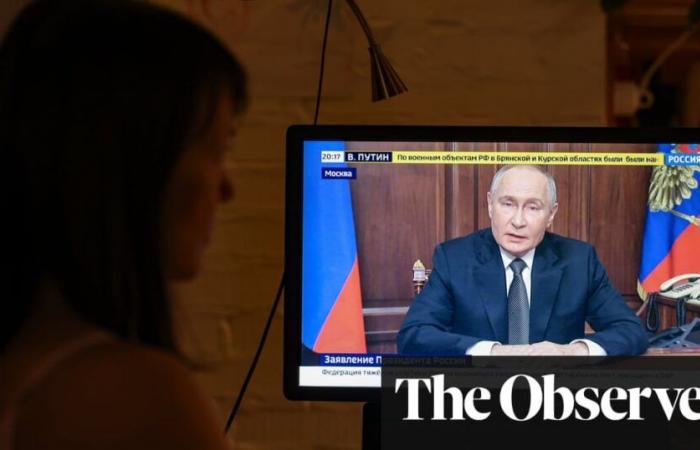The unprecedented firing by Ukrainian forces of British-made long-range Storm Shadow missiles at military targets inside Russia last week means the UK, along with the US, is now viewed by Moscow as a legitimate target for punitive, possibly violent retaliation.
In a significant escalation in response to the missile launches, Vladimir Putin confirmed that, for the first time in the war, Russia had fired an intermediate-range ballistic missile, targeting the Ukrainian city of Dnipro. Putin also said Russia now believed it had the “right” to attack “military facilities” in countries that supply Kyiv with long-range weapons. Though he did not say so specifically, he clearly meant attacks on the UK and US.
Yet in truth, Britain and its allies have been under constant Russian attack since the war began. Using sabotage, arson, deniable cyber-attacks and aggressive and passive forms of covert “hybrid” and “cognitive” warfare, Putin has tried to impose a high cost for western support of Ukraine.
This largely silent struggle does not yet amount to a conventional military conflict between Nato and its former Soviet adversary. But in an echo of Cuba in 1962, the “Ukraine missile crisis” – fought on land, air and in the dark-web alleyways and byways of a digitised world – points ominously in that direction.
Concern that Russia’s illegal, full-scale 2022 invasion of Ukraine would trigger a wider war has preoccupied western politicians and military planners from the start. The US, UK and EU armed and bankrolled Kyiv and placed unprecedented, punitive sanctions on Moscow.
But US president Joe Biden remained cautious. His primary aim was to contain the conflict. So the convenient fiction developed that the west was not fighting Russia but, rather, helping a sovereign Ukraine defend itself. That illusion was never shared by Moscow.
From the outset, Putin portrayed the war as an existential battle against a hostile, expansionist Nato. Russia was already big on subversion. But as the conflict unfolded, it initiated and now appears to be accelerating a wide array of covert operations targeting western countries.
Biden’s decision on long-range missiles, and Moscow’s furious vow to hit back, has placed this secret campaign under a public spotlight. Russian retaliation may reach new heights. But in truth, Putin’s shadow war was already well under way.
Last week’s severing of Baltic Sea fibre-optic cables linking Finland to Germany and Sweden to Lithuania – all Nato members – is widely regarded as the latest manifestation of Russian hybrid warfare, and a sign of more to come.
Some suggest the damage was accidental. “Nobody believes that,” snarled Boris Pistorius, Germany’s defence minister.
Such scepticism is based on hard experience. Last year, Finland said a damaged underwater natural gas pipeline to Estonia had probably been sabotaged. And an investigation in Nordic countries found evidence that Russia was running spy networks in the Baltic and North Sea, using fishing vessels equipped with underwater surveillance equipment. The aim, it said, was to map pipelines, communications cables and windfarms – vulnerable targets of possible future Russian attacks.
Earlier this month, a Russian ship, the Yantar – supposedly an “oceanographic research vessel” – had to be militarily escorted out of the Irish Sea. Its unexplained presence there, and previously off North Sea coasts and in the English Channel, where it was accompanied by the Russian navy, has been linked to the proximity of unprotected seabed inter-connector cables carrying global internet traffic between Ireland, the UK, Europe and North America.
Suspected Russian hybrid warfare actions on land, in Europe and the UK, are multiplying in scope and seriousness. They range from large-scale cyber-attacks, as in Estonia, to the concealing of incendiary devices in parcels aboard aircraft in Germany, Poland and the UK.
Western spy agencies point the finger at the GRU, Russia’s military intelligence agency (which was responsible for the 2018 Salisbury poisonings). Naturally, all this is denied by the Kremlin.
It gets even more alarming. In the summer, US and German intelligence agencies reportedly foiled a plot to assassinate top European defence industry executives, in an apparent effort to obstruct arms supplies to Kyiv.
Putin’s agents have been blamed for a wide variety of crimes, from assassinations of regime critics on European soil, such as the 2019 murder in Berlin of a Chechen dissident, to arson – for instance, at a warehouse in east London this year – to the intimidation of journalists and civil rights groups, and the frequent harassment and beating of exiled opponents.
National infrastructure, elections, institutions and transport systems are all potential targets of hostile online malefactors, information warfare and fake news, as Britain’s NHS discovered in 2017 and the US in 2016 and 2020 during two presidential elections.
Some operations are random; others are carried out for profit by criminal gangs. But many appear to be Russian state-organised. Such provocations are intended to sow chaos, spread fear and division, exacerbate social tensions among Ukraine’s allies and disrupt military supplies.
In January, for example, a group called the Cyber Army of Russia Reborn caused significant damage to water utilities in Texas. Biden administration officials warned at the time that disabling cyber-attacks posed a threat to water supplies throughout the US. “These attacks have the potential to disrupt the critical lifeline of clean and safe drinking water,” state governors were told.
Alerts about Russia’s escalating activities have come thick and fast in recent months. Kaja Kallas, the former Estonian prime minister and newly nominated EU foreign policy chief, spoke earlier this year about what she called Putin’s “shadow war” waged on Europe. “How far do we let them go on our soil?” Kallas asked.
In May, Donald Tusk, Poland’s prime minister, accused Moscow of repeated acts of sabotage. In October, Ken McCallum, head of MI5, said the GRU was engaged in “a sustained mission to generate mayhem on British and European streets”.
Nato’s new secretary-general, Mark Rutte, a former Dutch prime minister, added his voice this month. Moscow, he said, was conducting “an intensifying campaign of hybrid attacks across our allied territories, interfering directly in our democracies, sabotaging industry and committing violence … the frontline in this war is no longer solely in Ukraine.”
It remains unclear, despite these warnings, how prepared Europe is to acknowledge, first, that it is now under sustained attack from Russia and is involved, de facto, in a limitless, asymmetrical war; and second, what it is prepared to do about it at a moment when US support for Nato and Ukraine has been thrown into doubt by Donald Trump’s re-election.
When the foreign ministers of Poland, Germany and France – the so-called Weimar Triangle – plus the UK, Italy and Spain met in Warsaw last week, they tried to provide answers. “Moscow’s escalating hybrid activities against Nato and EU countries are unprecedented in their variety and scale, creating significant security risks,” they declared.
But their proposed solution – increased commitment to Europe’s shared security, higher defence spending, more joint capabilities, intelligence pooling, a stronger Nato, a “just and lasting peace” in Ukraine and a reinforced transatlantic alliance – was more familiar wishlist than convincing plan of action. Putin is unlikely to be deterred.
Far from it, in fact. Last week’s missiles-related escalation in verbal hostilities has highlighted the Russian leader’s flat refusal to rule out any type of retaliation, however extreme.
His mafioso-like menaces again included a threat to resort to nuclear weapons.
Putin’s very public loosening of Russia’s nuclear doctrine, which now hypothetically allows Moscow to nuke a non-nuclear-armed state such as Ukraine, was a tired propaganda ploy designed to intimidate the west. Putin is evil but he’s not wholly mad. Mutual assured destruction remains a powerful counter-argument to such recklessness.
Putin has other weapons in his box of dirty tricks, including, for example, the seizing of blameless foreign citizens as hostages. This kind of blackmail worked recently when various Russian spies and thugs were released from jail in the west in return for the freeing of Wall Street Journal reporter Evan Gershkovich and others.
Putin also has another nuclear card up his sleeve. Greenpeace warned last week that Ukraine’s power network is at “heightened risk of catastrophic failure”. Russian airstrikes aimed at electricity sub-stations were imperilling the safety of the country’s three operational nuclear power plants, the group said. If the reactors lost power, they could quickly become unstable.
And then there is the possibility, floated by analysts, that Russia, by way of retaliation for Biden’s missile green light, could increase support for anti-western, non-state actors, such as the Houthis in Yemen. In a way, this would merely be an extension of Putin’s current policy of befriending “outlaw” states such as Iran and North Korea, both of which are actively assisting his Ukraine war effort.
All of which, taken together, begs a huge question, so far unanswered by Britain and its allies – possibly because it has never arisen before. What is to be done when a major world power, a nuclear-armed state, a permanent member of the UN security council, a country sworn to uphold the UN charter, international human rights treaties and the laws of war, goes rogue?
Putin’s violently confrontational, lawless and dangerous behaviour – not only towards Ukraine but to the west and the international order in general – is unprecedented in modern times. How very ironic, how very chastening, therefore, is the thought that only another rogue – Trump – may have a chance of bringing him to heel.
Biden can do nothing now to halt the war. He had his chance in 2021-2022 and blew it. His missiles, landmines and extra cash have probably come too late. And in two months’ time, he will be gone.
On the other hand, Trump’s warped idea of peace – surrendering one quarter of Ukraine’s territory and barring it from Nato and the EU – may look increasingly attractive to European leaders with little idea how to curb both overt and covert Russian aggression or how to win an unwinnable war on their own.
Putin calculates that Europe, prospectively abandoned by the US, fears a no-longer-hybrid, only too real, all-out war with Russia more than it does the consequences of betraying Ukraine.
Cynical brute that he is, he will keep on clandestinely pushing, probing, provoking and punishing until someone or something breaks – or Trump bails him out.






